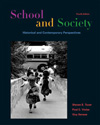| The events below should help you situate the educational developments
in this chapter in a broader historical context. Every chapter will have
such a timeline. In each chapter, the events are illustrative-you might
have chosen differently if you were constructing a timeline of your own.
For any item, you should be able to consider, "What is its educational
significance?" Some events are not mentioned in the text narrative
and might lead you to further inquiry. Finally, you might find the Online
Learning Center useful: www.mhhe.com. |
The Breakdown of Feudalism in Europe |
| 1452 | Leonardo Da Vinci is born |
| 1455 |
Gutenberg prints the first book |
| 1475 | Michelangelo is born |
| 1509 | Erasmus publishes educational treatise Praise of Folly |
| 1516 | Castiglione publishes educational treatise The Book of the
Courtier |
| 1534 |
Martin Luther publishes German translation of the Bible |
| 1543 | Copernicus publishes Revolutions of the Heavenly Bodies |
| 1605 | Shakespeare writes Macbeth and King Lear |
| 1616 | Shakespeare and Cervantes, author of Don
Quixote, die
|
| 1627 | Kepler's Rudolfine Tables and Bacon's New Atlantis are published |
| 1687 | Newton writes Principia Mathematica |
| 1689 | The Bill of Rights and The Act of Toleration are
declared in England
|
| 1690 |
John Locke writes An Essay Concerning
Human Understanding
|
Pre- Revolutionary Period |
| 1607 | Jamestown is established by English settlers |
| 1636 | Harvard College is founded |
| 1647 | Massachusetts law requires that every town |
| 1690 |
The New England Primer, a widely used colonial textbook, is published |
| 1693 | College of William and Mary is founded in Virginia |
| 1701 | Yale University is founded in Connecticut |
| 1734-35 | Freedom of press in American colonies is established |
| 1746 | Princeton University is founded in New Jersey |
Early National Period in United States |
| 1776
| Continental
Congress adopts Declaration of Independence |
| 1779 | Jefferson unsuccessfully proposes his Virginia Plan for public
schools |
| 1783 | Noah Webster's American Spelling Book is published |
| 1789
| Power-
driven textile machinery arrives in the
of Independence
|
| 1789 | Constitution is ratified by 11 of 13 states |
| 1789-97 | George Washington serves as first president for public schools |
| 1791 | U.S. Bill of Rights is ratified |
| 1793 | Eli
Whitney invents cotton gin |
| 1797-1801 | John Adams serves as second president |
Early 1800s |
| 1800 |
First of a series of southern state laws barring blacks from access to education
is passed in South Carolina. |
| 1800 | Jefferson is elected U.S. president by vote in the House
of Representatives to break tie in electoral votes |
| 1801-1809 | Jefferson serves as third president |
| 1803 |
Jefferson authorizes purchase of Louisiana Territory |
| 1818 | First teacher's journal, The Academician, is published |
| 1826 | On July 4, 50 years after the Declaration, Jefferson and John
Adams die |



 2002 McGraw-Hill Higher Education
2002 McGraw-Hill Higher Education